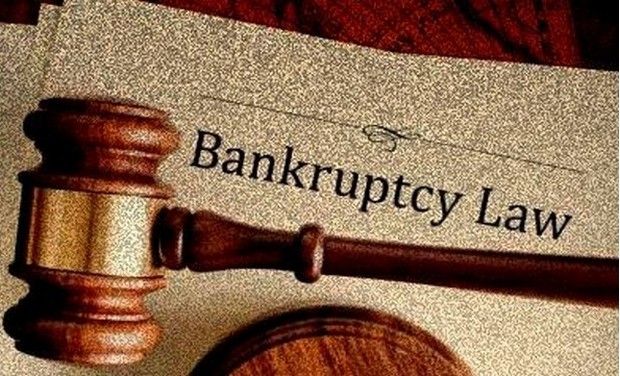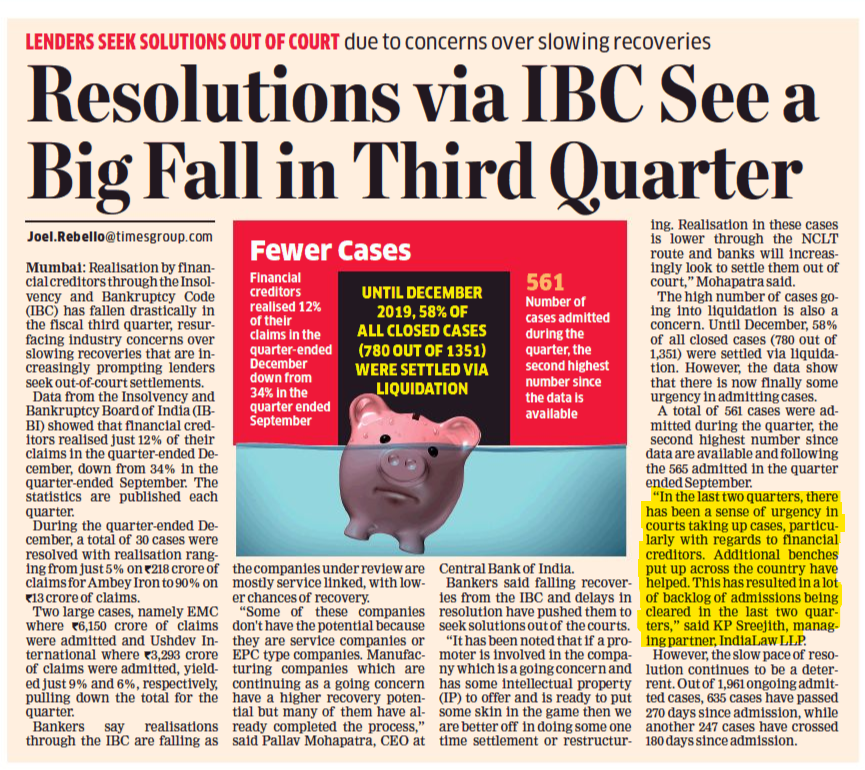Validity of Demand Notice Issued by Lawyers Under IBC


Validity of a demand notice under the Insolvency and Bankruptcy Code 2016 (“IBC”) issued by a lawyer on behalf of his client came under the consideration of National Company Law Appellate Tribunal (“NCLAT”), the appellate tribunal under IBC, in recent cases. Section 8 of the IBC Code mandates that to initiate a corporate insolvency resolution process under IBC, an operational creditor has to serve a demand notice in the prescribed format to the operational debtor.
The issue came up for the first time before NCLAT in August 2017 in Uttam Galve Steels Limited v. DF Deutsche Forfait AG & Anr.[1] In this case, NCLAT was considering an appeal filed against an order of the National Company Law Tribunal, which admitted an application filed by the operation creditor under the IBC. One of the contentions of the appellant (debtor) was that the demand notice was not issued by the respondent (operation creditor) but through their lawyer, who was not an authorized person. While considering this contention, NCLAT examined the formats of demand notices under IBC and held that demand notice/invoice needs to be issued either by the operational creditor or by a person who is authorized to act on behalf of the operational creditor. NCLAT held that a demand notice is different from a lawyer notice. An advocate/company secretary/chartered accountant can send demand notice on behalf of corporate debtor only if he has the authority of the board of directors of the debtor. Further, he also has to state his position or relation with debtor in the demand notice. In the absence of such authority, his notice is not as per the format prescribed under IBC and not invalid.
While laying down the judgment, NCLAT stipulated the following:
- On occurrence of default, the operational creditor is required to deliver the demand notice/invoice of unpaid operational debt to the corporate debtor in Form 3/Form 4 stipulated under Rule 5 of the Insolvency and Bankruptcy (Application to Adjudicating Authority) Rules, 2016.
- Through the said formats, the corporate debtor is to be informed of particulars of operational debt, with a demand of payment, with clear understanding that the operational debt (in default) is required to be repaid unconditionally within ten days from the date of receipt of notice, failing which the operational creditor will initiate a corporate insolvency process against the debtor.
- Only if the demand notice is served in such form and manner, the corporate debtor will understand the serious consequences of non-payment of operational debt, which is the initiation of resolution process without any opportunity to contest unless there is any existing dispute. Otherwise, the debtor may decide to contest the demand notice, as in the case of any normal legal notice, at the time of filing the suit/case. Hence, it was held that a lawyer/chartered accountant/company secretary, in absence of any authority of the board of directors and holding no position with or in relation to the operational creditor, couldn’t issue a demand notice under Section 8 of the IBC.
The issue again came up before NCLAT in November 2017 in Senthil Kumar Karmegam v. Dolphin Offshore Enterprises & Anr[2] where it was held that insolvency resolution process cannot be initiated by a demand notice sent by an advocate of the operational creditor to the debtor when there was nothing on record to suggest that the advocate in question held any position with or in relation to the operational creditor.
The issue once again came up before NCALT in November in Goa Antibiotics & Pharmaceuticals Ltd v. Lark Chemichals Pvt.Ltd. [3] where it was held that initiation of insolvency resolution process on the basis of a demand notice issued by a law firm is invalid, even if the said law firm is authorized by a board resolution of the creditor. In the current case, the appellant debtor’s counsel submitted that the demand notice was not issued by the operational creditor but by a law firm and in the said demand notice, the law firm had not mentioned its position and relation with the operational creditor. The respondent operational creditor’s counsel, however, relied on board resolution of the respondent and submitted that by the said resolution the respondent authorized the concerned law firm to send the demand notice on behalf of the respondent to the appellant. NCLAT, reiterating its view taken in Uttam Galve Steels Limited, held that there was nothing on record to suggest that the law firm, which issued the demand notice, held any position with or in relation to the respondent and hence, the demand notice was not issued in mandatory Form 3/Form 4. Accordingly, NCLAT dismissed the initiation of resolution process against the Respondent.
The above judgments of NCLAT currently settle the law that a lawyer/company secretary/ chartered accountant cannot send a demand notices on behalf of operational creditor unless he is authorized by a board resolution (in the case of corporate creditor) and the demand notice has to clearly state the position or relation he holds with the operation creditor.
[1] Company Appeal (AT) (Insolvency) 39 of 2017
[2] Company Appeal (AT) (Insolvency) No. 154 of 2017
[3] Company Appeal (AT) (Insolvency) No. 184 of 2017
This article is written by Arundhati Sukhtankar with inputs from Research Team of IndiaLaw, a law firm in India.



